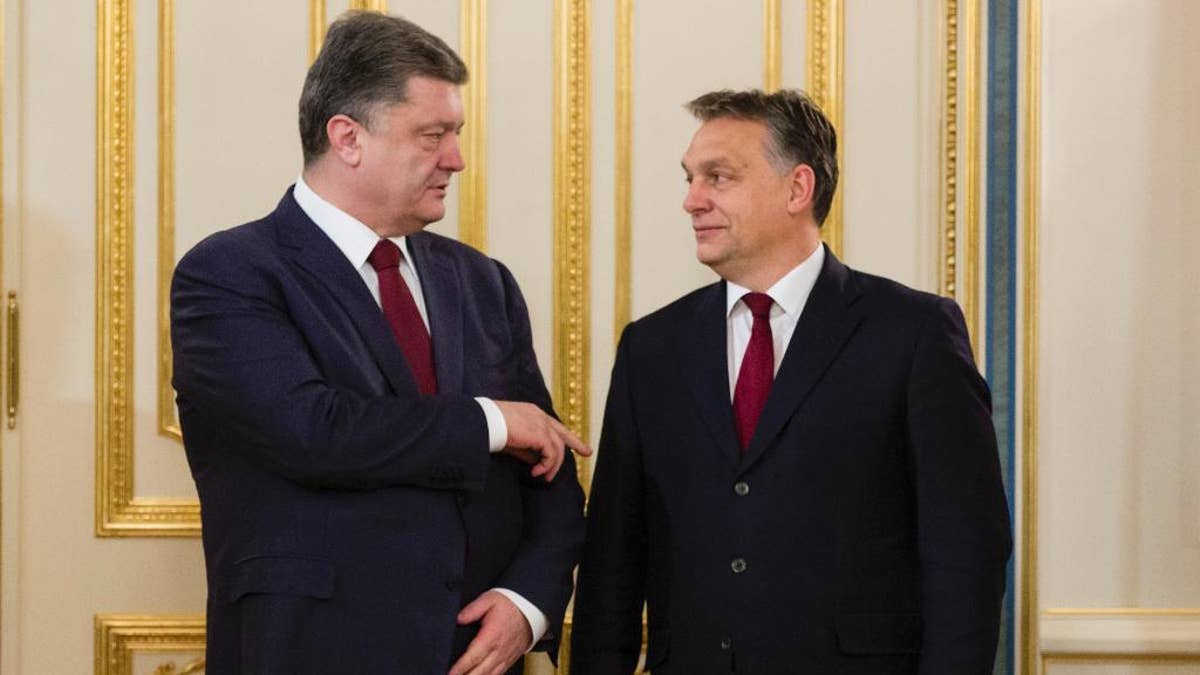
Ukraine's President Petro Poroshenko, left, talks with Hungarian Prime Minister Viktor Orban in Kiev, Ukraine, Friday, Feb. 13, 2015. (AP Photo/Mikhail Palinchak, Pool) (The Associated Press)
WASHINGTON – The Obama administration on Friday accused Russia and pro-Russian separatists of violating "the spirit" of a peace deal for Ukraine with weapons shipments and intensified fighting before a ceasefire takes effect this weekend.
The allegations came as fierce fighting surged in eastern Ukraine as the separatists mounted a major, sustained offensive to capture the strategic railway hub of Debaltseve. Clashes and artillery strikes killed at least 15 people across the region before the truce is to take effect Sunday. The violence dimmed already faint hopes for the peace accord sealed Thursday in the Belarusian capital of Minsk by the leaders of Russia, Ukraine, Germany and France.
The United States was not a party to that agreement, but on Thursday the administration welcomed it cautiously as a "potentially significant step" in ending the conflict that has claimed more than 5,300 lives. A day later, however, the administration was denouncing the continued violence during the pre-ceasefire period and placing the blame for it on Russia and the rebels.
"We are very concerned about continued fighting along and beyond the line of contact, including in heavily populated civilian areas, and reports of additional resupplies of tanks and missile systems coming across the border from Russia in the past few days," State Department spokeswoman Jen Psaki told reporters. She added that the U.S. had intelligence that Russia is preparing to send a large shipment of supplies to the rebels.
"This is clearly not in the spirit of this week's agreement," Psaki said. "All parties must show complete restraint in the run up to the Sunday ceasefire, including an immediate halt to the Russian and separatist assault on the Debaltseve and other Ukrainian towns."
In addition, she accused Russia of backing out of another key part of the agreement — a pledge by all sides to release illegally held prisoners and hostages — by saying that Nadezhda Savchenko, a Ukrainian air force officer imprisoned in Moscow and charged in the deaths of two Russian journalists in east Ukraine, would not be freed. Russia claims Savchenko voluntarily crossed the border into Russia before she was detained, which she denies.
"She's a hostage of the Russian government and she must be released immediately," Psaki said. "This week's agreement calls for the exchange of all hostages and illegally held persons taken during the conflict. In our view, this clearly includes Nadezhda Savchenko."
Despite their deep reservations about prospects for the peace accord, U.S. officials said any action on possibly supplying lethal aid to Ukraine or new sanctions on Russia is on hold pending the situation on the ground in Ukraine.
"The same options that have been on the table remain on the table," Psaki said. "Obviously, we'll be watching closely to see what happens over the course of the coming days."
Although they welcomed the Minsk deal in principle, U.S. officials have been concerned that it may give too much to Russia and the pro-Russian rebels. U.S. officials are highly skeptical that either the rebels or Russia will abide by the pact, which lays out a series of phased steps for Ukraine and the separatists to take, starting with the ceasefire.
Should Russia and the rebels not comply, U.S. officials say they are ready to raise the costs for Moscow with additional sanctions. As fighting intensified in recent weeks, the U.S. publicly floated the idea of sending defensive weapons to help Kiev defend itself. News that the White House was reconsidering its previous opposition to arms transfers was followed in quick successions by a flurry of European and Russian diplomatic activity that led to the Minsk meeting.

